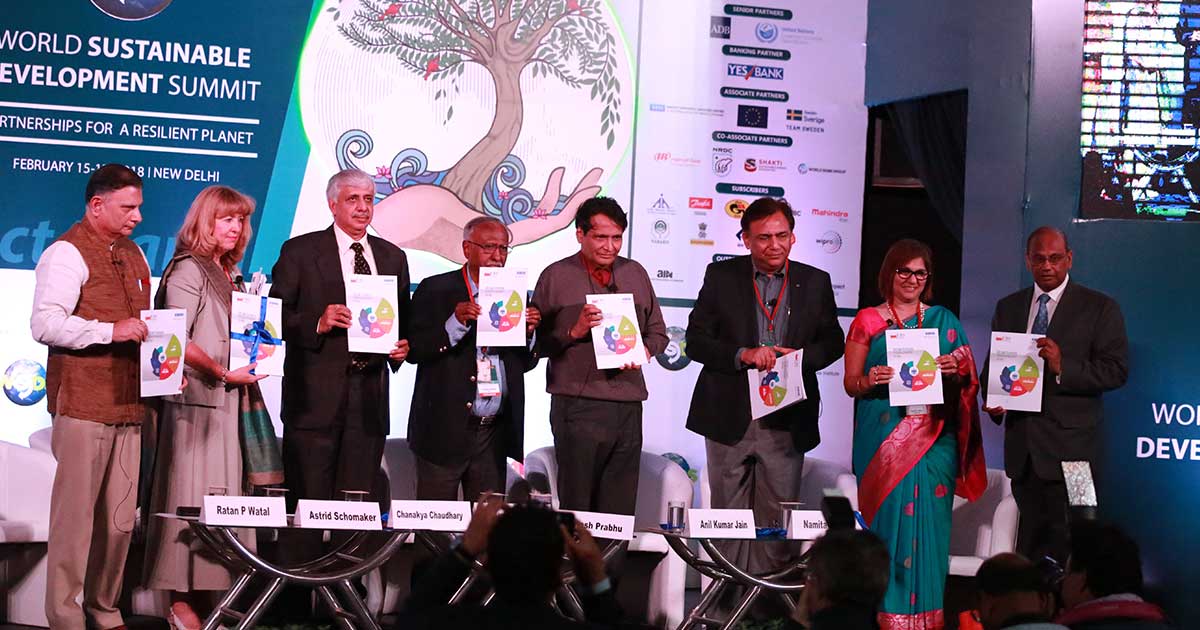
Making Circular Economy a Business Decision
 Shri Suresh Prabhu, Union Commerce Minister (fourth from right), released the TERI and Yes Bank report on 'Circular Economy: A Business Imperative for India' at WSDS 2018
Shri Suresh Prabhu, Union Commerce Minister (fourth from right), released the TERI and Yes Bank report on 'Circular Economy: A Business Imperative for India' at WSDS 2018
Nature doesn't throw anything away, because there is no 'away'
The session on ‘Policy & Business in Action towards Closing the Loop’ began with these very words. Touching upon the issue of resource efficiency and circular economy, the discussion at WSDS 2018 also witnessed the release of the report titled Circular Economy: A Business Imperative for India by TERI and YES Bank.
The panelists recognized the need for a policy in the matter and for a Bureau of Resource Efficiency similar to the Bureau of Energy Efficiency (BEE), described by Dr Prodipto Ghosh, Distinguished Fellow, TERI, as ‘an idea whose time has come’.
Addressing the audience, Shri Suresh Prabhu, Union Minister of Commerce and Industry, Government of India, said that the quantum of material available in the world today may not remain the same and so it is time to rethink product use. It is time to find out how we can design a product so that the material can be reused later. Agreeing that policy and governmental role is important, he still stressed on the importance of the private sector in bringing about resource efficiency, especially in business. In his view, there is an opportunity for disruption in this area and the government’s start-up programme can support those who want to step in.
Giving the financial sector’s perspective, Ms Namita Vikas, Group President and Global Head, Climate Strategy and Responsible Banking, YES Bank, said that in order to move to the next stage in their evolution, businesses would have to move towards circular models and it’s a market that fits into the sustainable targets of many financial institutions. The challenge lies in the fact that in traditional business models, the risks are known but in the new concept of circular economy, that is not the case.
Connecting resource efficiency to competitiveness, Mr Chanakya Chaudhary, Group Director, Corporate Communications and Regulatory Affairs, TATA Steel, said that it makes business sense to become more resource efficient. He added that the government had done its bit with policy interventions, but more is needed with time.
Citing examples of practices at TATA Steel, Mr Chaudhary also spoke about behavioural change, something that Ms Astrid Schumaker, Director, Global Sustainable Development, Environment Directorate-General, European Commission, also stressed upon. Mentioning about the increasing resource costs, she said that businesses in Europe want to become more circular.
She also talked on the role of partnerships such as the Indo-European partnerships to bring in more resource efficiency in business. Mr Ratan P Watal, Member Secretary, Economic Advisory Council, mentioned that NITI Aayog, GIZ, and others had worked together to create a strategy paper on resource efficiency, which also mooted the idea of a Bureau of Resource Efficiency. He agreed that as of now, there is no policy on resource efficiency in India and partnerships are required there as well.